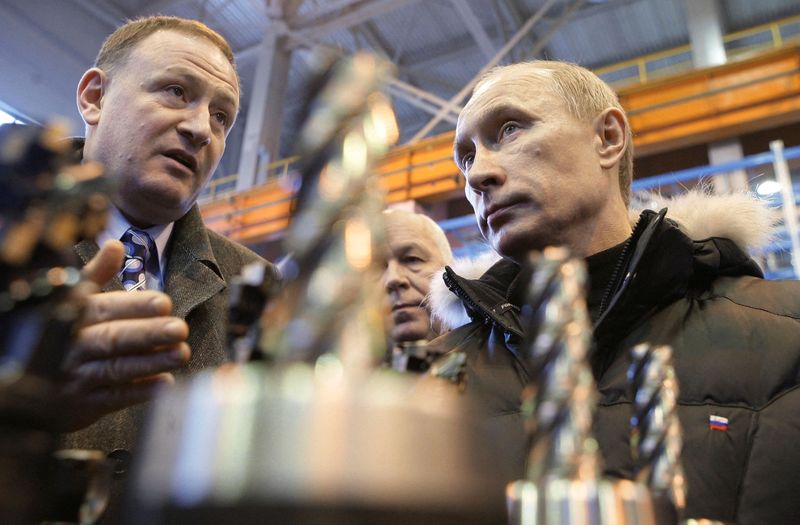By Mike Stone and Tim Hepher
WASHINGTON/PARIS (Reuters) - Western aerospace companies have increased stocks of titanium and are scrambling to shore up supply chains in case the metal used widely in planemaking is thrust into a potential trade war between Russia and the West.
Russia has massed tens of thousands of troops near Ukraine's border as it presses demands for a new security arrangement in Europe, prompting U.S. and European officials to threaten a barrage of sanctions if it invades.
As a result, Western industrial companies are auditing their supply chains for Russian components in case Moscow retaliates.
Titanium, much of it supplied by Russia, has been used in commercial jet engines and other parts for decades.
But its use has soared in recent years with the latest lightweight jets, such as the Boeing (NYSE:BA) 787 and Airbus A350, reaching 14-15% of an empty jetliner by weight.
Neil Mitchill, chief financial officer of Raytheon Technologies (NYSE:RTX), the world's largest aerospace contractor, told Reuters it was "monitoring the developments" and working to ensure its supply chain was secure for the coming 12 months.
The maker of Pratt and Whitney jet engines said it had two or more sources of titanium and other key raw materials, but did not give further details.
Boeing, which relies heavily on Russian titanium giant VSMPO-AVISMA, is "protected for quite a while, but not forever," Chief Executive David Calhoun said on Wednesday.
Industry sources said Western aerospace firms have been increasing inventory or diversifying sources of supply since 2014 when Russia was sanctioned for its annexation of Crimea from Ukraine, even though titanium was not directly targeted.
Their situation has been made easier by the fact that fewer jets are being assembled as a result of the pandemic, giving them opportunities to stockpile reserves.
"During the Crimea crisis, everybody created safety stocks and second sources of titanium but eventually nothing happened (on sanctions)," a senior European industry source said.
No aerospace company contacted by Reuters would disclose its level of titanium stocks.
STRATEGIC ASSET
Once a Cold War material used to build spy planes and submarines, titanium is widely seen as a test case for economic interdependence in strategic sectors like civil aerospace.
At the Dubai Airshow in November, Boeing provisionally renewed a two-decade partnership with VSMPO-AVISMA, agreeing to maintain it as its largest titanium supplier.
The world's biggest producer supplies 25% of global demand for titanium, a light but strong and corrosion-resistant metal also used in nuclear energy.
The same two companies also agreed to increase the use of a joint venture in Russia's Titanium Valley in the Urals.
Airbus and Brazil's Embraer also have long-term deals with VSMPO-AVISMA.
Airbus said it was "following the situation closely".
VSMPO-AVISMA and Embraer said they had no immediate comment.
Airbus has said it relies on Russia for half its titanium needs, while a U.S. industry source said VSMPO-AVISMA provided a third of Boeing's requirements.
For its part, VSMPO-AVISMA makes around three quarters of its sales from aerospace despite efforts to diversify.
In 2018, a draft law in Russia's parliament proposed restricting titanium exports in response to tightening Western sanctions. But the country's trade minister was reported saying the idea was blocked to prevent losing stable foreign buyers.
Even so, the outcome of a possible trade war if tensions boil over is difficult to predict, with stakes increasing as the United States threatens to target a key Russian gas pipeline.
S&P said last year Russia might limit exports of strategic materials due to tensions, but this was not the likeliest case.
The West is also unlikely to halt trade as it takes years to certify alternative suppliers, it said in a report.
The U.S. Commerce Department imposed restrictions on VSMPO-AVISMA in December 2020 only to reverse them three weeks later.
Targeting VSMPO-AVISMA would single out a strategic asset with close ties to Russia's defense industry, but quickly backfire on Western aerospace companies, industry sources said.
However, planemakers could still face higher titanium costs.
"Rather than iron-clad sanctions, it is more likely that supply constraints would raise prices broadly," Richard Aboulafia, managing director of AeroDynamic Advisory, said.
Coming on top of inflation fears, the burden could fall most heavily on commercial jets where it is harder to pass on costs. "The military side of the house can outbid anyone," he added.

In the United States, defense firms are shielded from any direct supply impact because the Pentagon generally dissuades contractors from using Russian raw materials.
"Most seasoned government contractors are well aware of the perils of doing business with Russia," said Franklin Turner, a government contracts lawyer at McCarter & English.
